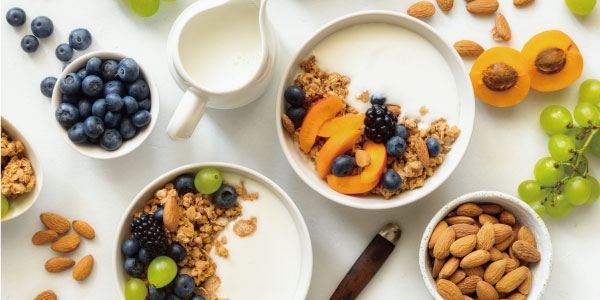Promotional Features
How innovations in probiotics and postbiotics are supporting immune health in an ageing world
As people worldwide live longer, supporting the health of an ageing population is a global medical and social challenge.
The World Health Organization (WHO) defines healthy ageing as a process of maintaining functional ability to enable wellbeing in older age. It forecasts that the global population of people aged 60 years and older will double to 2.1 billion by 2050, while those aged 80 years or older will triple to 426 million.1
We may be living longer but are we living those additional years in good health? Are we ageing ‘better’?
In many respects, living a longer life is a positive sign but this shift towards an ageing population is saddled with a raft of age-related health issues and diseases. During ageing, chronic low-grade inflammation – inflammaging – develops, contributing to the pathogenesis of chronic diseases, such as cardiovascular diseases, chronic kidney disease, diabetes mellitus and dementia, among others.2
Another side effect of ageing is that the immune system weakens, and this reduces the body’s ability to respond to vaccinations and fight infections. Senior adults can suffer from autoimmunity more frequently, which results from the dysregulation of immune system function, in turn leading to a growing risk of disease.3 In addition, older adults often suffer from gastrointestinal disorders such as constipation and diarrhoea.4
Gut microbiome health
Studies have shown that the composition of the gut microbiome undergoes significant age-related changes in healthy subjects, associated with health issues, inflammation and co-morbidity.5,6,7,8 However, the gut microbiota of supercentenarians – those reaching and living beyond 110 years of age – presents a high abundance of health-associated bacteria such as bifidobacteria.9,10
Research carried out by Morinaga found age-dependent changes in the gut microbiota in healthy Japanese subjects aged 0 to 104 years. There was a notable decrease in obligate anaerobes such as Bifidobacterium, but an increase in facultative anaerobes such as Escherichia coli in the elderly. This confirms that metabolites produced by the aged gut microbiota could contribute to intestinal and systemic homeostasis, and may cause or exacerbate systemic age-related diseases in the elderly.11
Probiotics to support healthy ageing
The COVID-19 pandemic drove an interest in immune health, and the market for immune-supporting foods, beverages, and supplements has steadily grown. Within this, the potential of probiotic and postbiotic ingredients to add years of healthy life has emerged as a breakthrough in the food and supplement industries. Certain probiotic and/or postbiotic strains have been shown support the gut microbiota and maintain a healthy immune system, among the key health concerns of older adults.
But for infant formula, supplement, and food manufacturers, selecting the right biotic strain is a complex task. Bifidobacterium longum BB536 is a superior strain of Human-Residential Bifidobacterium (HRB), a natural inhabitant of the human gut.12 Designated as BB536, the strain is one of the most well-established, clinically effective probiotic strains that confers numerous beneficial effects.
In a study involving patients aged over 65 years who were receiving enteral tube feedings, consumption of BB536 (at both low and high doses of 25 billion and 50 billion CFU/day) for 16 weeks improved the bowel movements of those experiencing infrequent defecation (≤4 times/week) as compared to the placebo control.13 Administration of BB536 also restored regular bowel movements in patients with a high frequency of defecation (≥10 times/week), and resulted in a significantly higher prevalence of normally formed stools than the placebo control.13
Other studies have shown that BB536 could improve waning immunity in the elderly, a health concern suggested to contribute to lower vaccine efficacy and increased risk of influenza virus.14,15 Multiple clinical studies have also demonstrated that BB536 could modulate immune responses in humans, especially in the elderly.16
BB536, combined with other nutraceutical compounds, has also shown potential in reducing cholesterol for the management of cardiovascular health and may improve cholesterol metabolism in adults and reduce their cardiovascular risk as they age. In a randomized, double-blind, placebo-controlled study, daily administration of a nutraceutical product containing BB536 (1 billion CFU), red yeast rice extract (10 mg monacolin K), 16 mg niacin, and 20 mg coenzyme Q10; n=16) for 12 weeks resulted in a significant improvement on the atherogenic lipid profile in subjects with low cardiovascular risk (median age 57 years) as compared to placebo.17
As a result, oral administration of the nutraceutical product significantly reduced total cholesterol (-16.7%), LDL cholesterol (-25.7%), non-HDL cholesterol (-24%) (all p < 0.0001), apolipoprotein B (apoB) (-17%, p=0.003) as compared to placebo.
Postbiotic supplementation for immune support
Another biotic ingredient in Morinaga’s arsenal is LAC-Shield™ (heat-killed L. paracasei MCC1849), a clinically proven postbiotic strain that possesses excellent immune-enhancing activity, with its unique immunological function serving as a ‘shield’ to protect the human body against invading enemies. LAC-Shield was selected for its highest capacity to induce the production of interleukin-12 (IL-12) – a potent activator of innate and adaptive immunity.18
Intake of LAC-Shield may also affect vaccine responsiveness, particularly in populations with reduced immunity. In a randomized, double-blind, placebo-controlled trial, intake of LAC-Shield-containing jelly was shown to improve responsiveness of vaccinations in the elderly as compared to the placebo.19
In Japan alone, LAC-Shield™ has been widely used by over 500 companies in more than 1,000 types of product. It has acquired self-affirmed GRAS status since 2018 and is Halal- and Kosher-certified. As an inactivated strain, it is heat-tolerant and highly stable to pH, making it easy to work with under major manufacturing conditions, offering the potential for innovative solutions as a functional ingredient in the immune health space.
In addition, Morinaga’s nutritional powdered milk formula Milk Seikatsu (meaning ‘Life with milk’) is an enriched powdered milk product that combines immune-supporting BB536 and LAC-Shield™ with lactoferrin, a functional protein, together with milk and essential nutrients, designed to promote the use of innovative probiotic and postbiotic solutions to support the immune system and improve the quality of life among global senior consumers.
As people around the world turn to nutritional products that can increase health-span, manufacturers who can meet the demand for natural, safe and scientifically-backed ingredients will empower the ever-increasing aging population as well as future generations to live out their later years to their full potential.
References
1. World Health Organization. Ageing and Health.
2. Franceschi C.; Garagnani P.; Parini P.; et al. Inflammageing: a new immune–metabolic viewpoint for age-related diseases. Nat Rev Endocrinol. 2018;14(10):576–90.
3. Montecino-Rodriguez E.; Berent-Maoz B.; Dorshkind K. Causes, consequences, and reversal of immune system ageing. J Clin Invest. 2013;123(3):958–65.
4. Dumic I.; Nordin T.; Jecmenica M.; et al. Gastrointestinal tract disorders in older age. Can J Gastroenterol Hepatol. 2019;2019.
5. Ragonnaud E.; Biragyn A. Gut microbiota as the key controllers of “healthy” aging of elderly people. Immun Ageing. 2021;18(1):1–11.
6. Biagi E.; Nylund L.; Candela M.; et al. Through ageing, and beyond: gut microbiota and inflammatory status in seniors and centenarians. PLoS One. 2010;5(5): e10667.
7. Jeffery IB.; Lynch DB.; O’Toole PW. Composition and temporal stability of the gut microbiota in older persons. ISME J. 2016;10(1):170–82.
8. Claesson MJ.; Jeffery IB.; Conde S.; et al. Gut microbiota composition correlates with diet and health in the elderly. Nature. 2012;488(7410):178–84.
9. Biagi E.; Rampelli S.; Turroni S.; et al.; et al. The gut microbiota of centenarians: signatures of longevity in the gut microbiota profile. Mech Ageing Dev. 2017;165:180–4.
10. Biagi E.; Franceschi C.; Rampelli S.; et al. Gut microbiota and extreme longevity. Curr Biol. 2016;26(11):1480–5.
11. Yoshimoto S.; Mitsuyama E.; Yoshida K.; et al. Enriched metabolites that potentially promote age associated diseases in subjects with an elderly-type gut microbiota. Gut Microbes. 2021;13(1):1–11.
12. Wong CB.; Odamaki T.; Xiao J-Z. Insights into the reason of Human-Residential Bifidobacteria (HRB) being the natural inhabitants of the human gut and their potential health-promoting benefits. FEMS Microbiol Rev. 2020.
13. Kondo J.; Xiao J.; Shirahata A.; et al. Modulatory effects of Bifidobacterium longum BB536 on defecation in elderly patients receiving enteral feeding. World J Gastroenterol. 2013;19(14):2162–70.
14. Akatsu H.; Iwabuchi N.; Xiao J.; et al. Clinical effects of probiotic Bifidobacterium longum BB536 on immune function and intestinal microbiota in elderly patients receiving enteral tube feeding. J Parenter Enter Nutr. 2013;37(5):631–40.
15. Namba K.; Hatano M.; Yaeshima T.; et al. Effects of Bifidobacterium longum BB536 administration on influenza infection, influenza vaccine antibody titer and cell-mediated immunity in the elderly. Biosci Biotechnol Biochem. 2010;74(5):939–45.
16. Wong CB.; Odamaki T, Xiao J-Z. Beneficial effects of Bifidobacterium longum subsp. longum BB536 on human health: Modulation of gut microbiome as the principal action. J Funct Foods. 2019;54.
17. Ruscica M.; Pavanello C.; Gandini S.; et al. Nutraceutical approach for the management of cardiovascular risk–a combination containing the probiotic Bifidobacterium longum BB536 and red yeast rice extract: results from a randomized, double-blind, placebo-controlled study. Nutr J. 2019;18(1):1–9.
18. Arai S.; Iwabuchi N.; Takahashi S.; et al. Orally administered heat-killed Lactobacillus paracasei MCC1849 enhances antigen-specific IgA secretion and induces follicular helper T cells in mice. PLoS One. 2018;13(6):e0199018.
19. Maruyama M.; Abe R.; Shimono T.; et al. The effects of non-viable Lactobacillus on immune function in the elderly: a randomised, double-blind, placebo-controlled study. Int J Food Sci Nutr. 2016;67(1):67–73.









